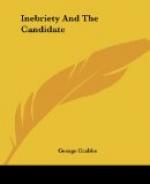AN INTRODUCTORY ADDRESS OF THE AUTHOR TO HIS POEMS.
Multa quidem nobis facimus mala saepe poetae,
(Ut vineta egomet caedam mea) cum tibi librum
Sollicito damus, aut fesso, &c.
Horace,
Epistle 1.
Ye idler things, that soothed my hours of care,
Where would ye wander, triflers, tell me where?
As maids neglected, do ye fondly dote,
On the tair type, or the embroider’d coat;
Detest my modest shelf, and long to fly
Where princely Popes and mighty Miltons lie?
Taught but to sing, and that in simple style,
Of Lycia’s lip, and Musidora’s smile;
—
Go then! and taste a yet unfelt distress,
The fear that guards the captivating press;
Whose maddening region should ye once explore,
No refuge yields my tongueless mansion more.
But thus ye’ll grieve, Ambition’s plumage
stript,
“Ah, would to Heaven, we’d died in manuscript!”
Your unsoil’d page each yawning wit shall flee,
- For few will read, and none admire like me. —
Its place, where spiders silent bards enrobe,
Squeezed betwixt Cibber’s Odes and Blackmore’s
Job;
Where froth and mud, that varnish and deform,
Feed the lean critic and the fattening worm;
Then sent disgraced—the unpaid printer’s
bane —
To mad Moorfields, or sober Chancery Lane,
On dirty stalls I see your hopes expire,
Vex’d by the grin of your unheeded sire,
Who half reluctant has his care resign’d,
Like a teased parent, and is rashly kind.
Yet rush not all, but let some scout
go forth,
View the strange land, and tell us of its worth;
And should he there barbarian usage meet,
The patriot scrap shall warn us to retreat.
And thou, the first of thy eccentric
race,
A forward imp, go, search the dangerous place,
Where Fame’s eternal blossoms tempt each bard,
Though dragon-wits there keep eternal guard;
Hope not unhurt the golden spoil to seize,
The Muses yield, as the Hesperides;
Who bribes the guardian, all his labour’s done,
For every maid is willing to be won.
Before the lords of verse a suppliant
stand,
And beg our passage through the fairy land:
Beg more—to search for sweets each blooming
field,
And crop the blossoms woods and valleys yield,
To snatch the tints that beam on Fancy’s bow;
And feel the fires on Genius’ wings that glow;
Praise without meanness, without flattery stoop,
Soothe without fear, and without trembling, hope.
TO THE READER.
The following Poem being itself of an introductory nature, its author supposes it can require but little preface.
It is published with a view of obtaining the opinion of the candid and judicious reader on the merits of the writer as a poet; very few, he apprehends, being in such cases sufficiently impartial to decide for themselves.




